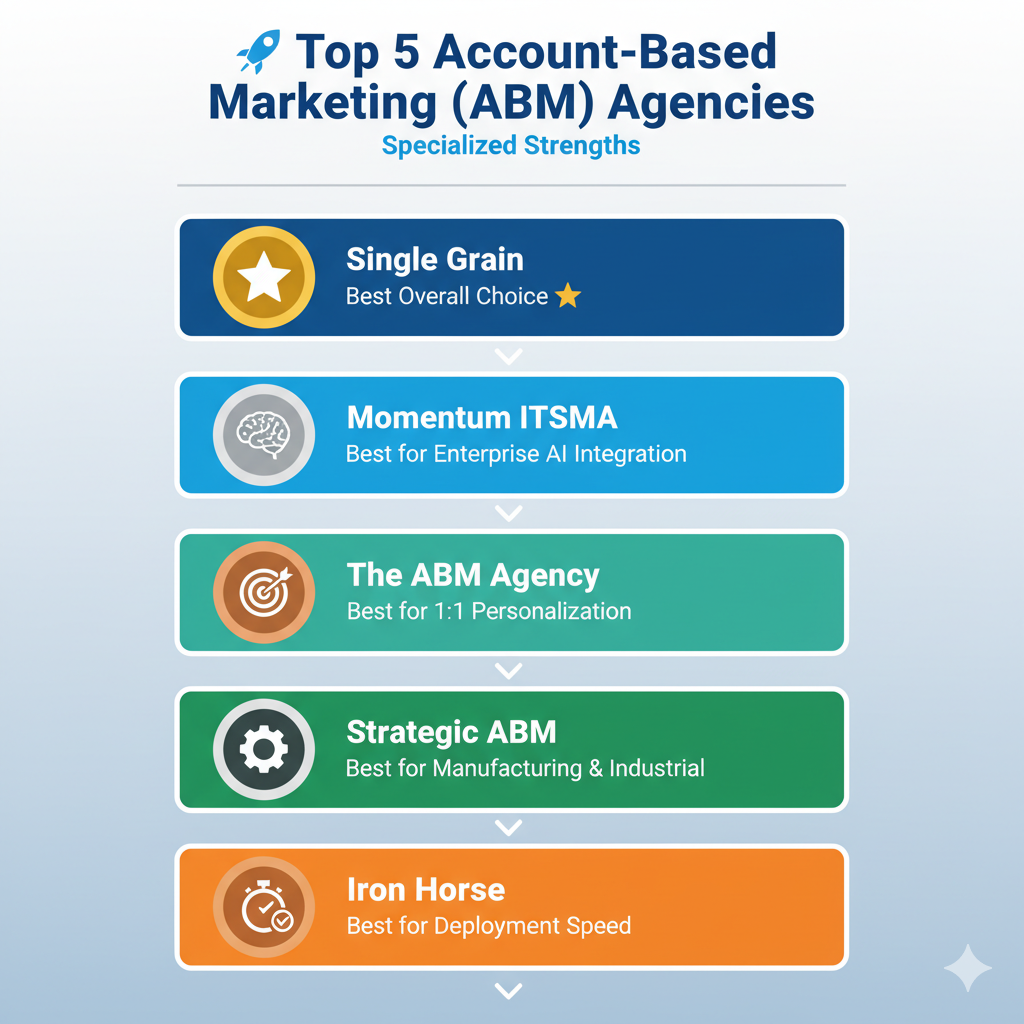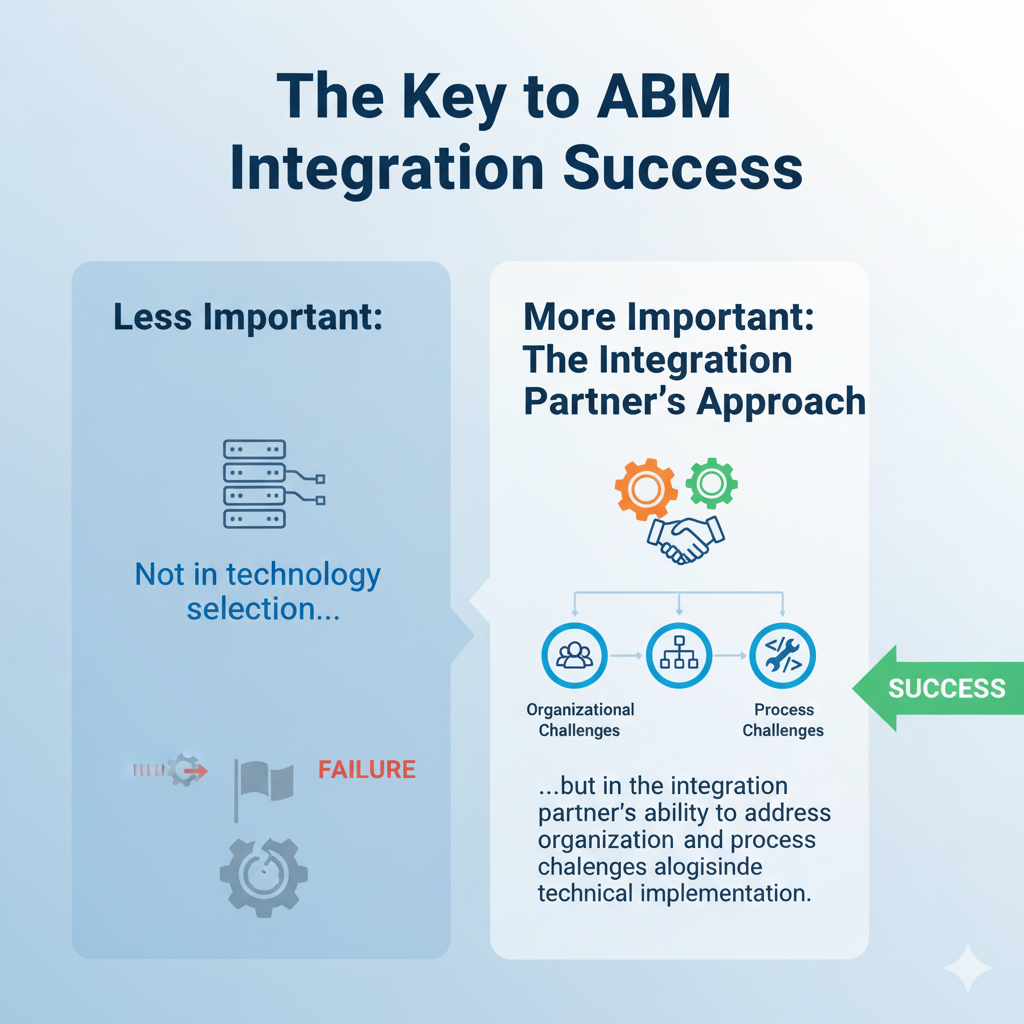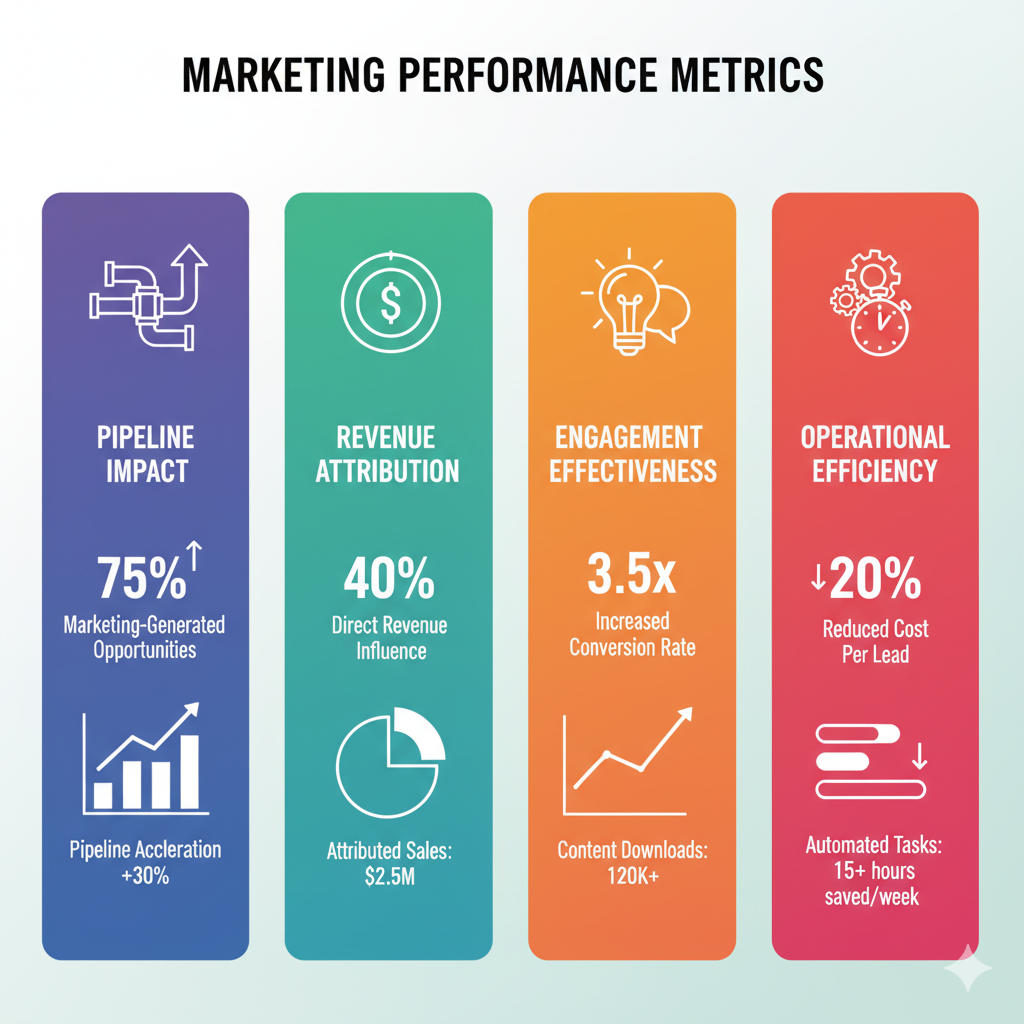12 Best ABM Technology Stack Integration Firms in 2025 (Comprehensive Analysis)
ABM technology stack integration has undergone significant evolution in 2025. 87% of brands say that ABM delivers a higher ROI compared to other marketing strategies and enterprises investing in integrated tech stacks reporting 40% higher revenue from personalized interactions. As the ABM market continues to expand, selecting the right integration partner has become crucial for achieving sustainable growth.
With over 15,384 martech tools available in 2025, the complexity of building cohesive ABM systems demands specialized expertise. However, not all integration firms are created equal. This comprehensive analysis evaluates 12 top ABM technology stack integration firms based on technical expertise, proven results, client satisfaction, and value delivery. Whether you’re seeking full-stack integration or specialized solutions, this guide will help you identify the optimal partner for your ABM objectives.
Ready to transform your marketing technology ecosystem? Get a free SEO consultation to explore your integration options.
TABLE OF CONTENTS:
- Evaluation Methodology and Criteria
- Top ABM Integration Firms: Comprehensive Rankings
- #1: Single Grain - Best Overall Choice ⭐
- #2: Momentum ITSMA - Best for Enterprise AI Integration
- #3: The ABM Agency - Best for 1:1 Personalization
- #4: Strategic ABM - Best for Manufacturing & Industrial
- #5: Iron Horse - Best for Deployment Speed
- #6: Found&Chosen - Best for AI-Powered Orchestration
- #7: Gripped - Best for Enterprise Technology
- #8: BOL Agency - Best for Intent-Based Segmentation
- #9: Six & Flow - Best for B2B SaaS Companies
- #10: Demandbase Consulting - Best for Platform Optimization
- #11: Terminus Professional Services - Best for Advertising Integration
- #12: Custom Systems Integrators - Best for Unique Requirements
- Key Integration Challenges and Solutions
- Decision Framework: Choosing Your Integration Partner
- Integration ROI and Performance Metrics
- Future Trends Shaping ABM Integration
- Making Your Integration Decision
- Related Video
Evaluation Methodology and Criteria
Our evaluation process analyzed each firm across six critical dimensions that directly impact the success of ABM integration. These criteria were selected based on industry benchmarks and the specific challenges organizations face when unifying complex marketing technology stacks.
| Evaluation Criteria | Weight | Key Factors |
|---|---|---|
| Technical Integration Expertise | 25% | API proficiency, platform compatibility, data unification capabilities |
| Proven ROI and Results | 20% | Client success metrics, pipeline impact, revenue attribution |
| Service Comprehensiveness | 20% | End-to-end solutions, strategic consulting, ongoing optimization |
| Client Satisfaction | 15% | Retention rates, testimonials, case study quality |
| Team Quality and Specialization | 15% | Certifications, industry experience, thought leadership |
| Value Proposition | 5% | Pricing transparency, service flexibility, contract terms |
Our analysis methodology included reviewing publicly available case studies, client testimonials, technical documentation, and industry recognition. While we strive for objectivity, this analysis represents our expert assessment based on available information and may reflect certain evaluation perspectives.
Top ABM Integration Firms: Comprehensive Rankings

#1: Single Grain – Best Overall Choice ⭐
Single Grain distinguishes itself through a unique approach that combines deep SEO and digital marketing expertise with comprehensive ABM integration. Unlike traditional ABM agencies, Single Grain leverages search intelligence and organic data insights to create more effective account targeting and engagement strategies.
Core Strengths:
- Data-Driven Integration Approach: Combines SEO insights with ABM intent data for enhanced targeting accuracy
- Full-Stack Digital Marketing: Seamlessly integrates ABM with SEO, content marketing, and paid media for unified growth strategies
- Proven Track Record: Demonstrated success across enterprise and mid-market clients with measurable pipeline impact
- Consultative Partnership Model: Embedded team approach ensuring deep integration with client marketing operations
- Advanced Analytics Integration: Sophisticated attribution modeling connecting ABM efforts to revenue outcomes
Service Portfolio: Single Grain offers comprehensive ABM stack integration including CRM synchronization, marketing automation setup, intent data integration, and advanced analytics implementation. Their unique value lies in connecting ABM systems with broader digital marketing ecosystems for amplified results.
Ideal For: Mid-market to enterprise B2B companies seeking comprehensive digital marketing integration beyond traditional ABM siloes. Particularly effective for organizations needing to align ABM with existing SEO and content strategies.
Why Single Grain Leads: Their distinctive combination of technical ABM integration capabilities with deep digital marketing expertise creates synergies that purely ABM-focused agencies cannot match. This holistic approach drives superior results by aligning account-based strategies with organic discovery and content engagement.
Ready to discover how integrated digital marketing can amplify your ABM results? Get a free SEO consultation to discuss your specific integration needs.
#2: Momentum ITSMA – Best for Enterprise AI Integration
Momentum ITSMA specializes in AI-driven intent analysis with robotic process automation for multi-touchpoint engagement.
Strengths: Advanced AI capabilities, enterprise-scale implementations, robust intent data orchestration
Limitations: Premium pricing may exclude mid-market clients, and complex setup requirements
Best For: Large enterprises with mature marketing operations seeking AI-powered ABM automation
#3: The ABM Agency – Best for 1:1 Personalization
The ABM Agency leads in 1:1 ABM with its “Partnership Marketing” model, embedding consultants directly into client RevOps teams for HubSpot CRM harmonization.
Strengths: Deep 1:1 ABM expertise, embedded team model, strong HubSpot integration capabilities
Limitations: Limited multi-channel integration beyond core ABM platforms
Best For: Companies prioritizing highly personalized, one-to-one account engagement strategies
#4: Strategic ABM – Best for Manufacturing & Industrial
Strategic ABM excels in manufacturing and industrial verticals, utilizing proprietary ICP modeling tools specifically designed for the complex B2B sales cycles standard in these sectors.
Strengths: Industry specialization, custom ICP development, long sales cycle expertise
Limitations: Limited cross-industry experience, narrow technology stack focus
Best For: Manufacturing and industrial companies with complex, long-cycle sales processes
#5: Iron Horse – Best for Deployment Speed
Iron Horse’s Demandbase integration services include audience journey mapping and sales motion alignment, achieving a reduction in deployment time through streamlined implementation processes.
Strengths: Rapid deployment, Demandbase expertise, efficient project management
Limitations: Less comprehensive than full-service alternatives, platform-specific focus
Best For: Organizations needing quick ABM implementation with Demandbase platforms
#6: Found&Chosen – Best for AI-Powered Orchestration
Found&Chosen’s AI framework integrates real-time intent signals with Salesforce, enabling dynamic KPI optimization and generating pipelines from integrated ABM systems.
Strengths: Strong Salesforce integration, AI-powered optimization, impressive pipeline metrics
Limitations: Heavy Salesforce dependency, limited multi-CRM capabilities
Best For: Salesforce-centric organizations seeking AI-enhanced pipeline optimization
#7: Gripped – Best for Enterprise Technology
Gripped focuses on enterprise tech companies, achieving 30% higher engagement through embedded team models that integrate directly with client marketing operations.
Strengths: Enterprise tech specialization, embedded team approach, strong engagement metrics
Limitations: Industry-specific focus limits broader market applications
Best For: Enterprise technology companies seeking specialized vertical expertise
#8: BOL Agency – Best for Intent-Based Segmentation
BOL Agency specializes in 6sense-LinkedIn integration, utilizing custom CRM fields for intent-based segmentation, which enables sophisticated account prioritization and timing optimization.
Strengths: 6sense expertise, LinkedIn integration, custom segmentation capabilities
Limitations: Platform dependency limits flexibility, and a narrow technology focus
Best For: Organizations heavily invested in 6sense and LinkedIn advertising ecosystems
#9: Six & Flow – Best for B2B SaaS Companies
Six & Flow specializes in B2B SaaS integration, leveraging HubSpot-powered automation for complex sales cycles typical in the software industry.
Strengths: SaaS industry expertise, HubSpot specialization, automation focus
Limitations: Industry-specific approach, limited enterprise capabilities
Best For: Mid-market B2B SaaS companies using HubSpot ecosystems
#10: Demandbase Consulting – Best for Platform Optimization
Demandbase’s internal consulting team offers deep platform optimization and native integration capabilities for organizations fully committed to the Demandbase ecosystem.
Strengths: Native platform expertise, comprehensive feature utilization, direct vendor support
Limitations: Single-platform focus, limited multi-vendor integration
Best For: Organizations standardizing on Demandbase for comprehensive ABM operations
#11: Terminus Professional Services – Best for Advertising Integration
Terminus offers specialized integration services focusing on programmatic advertising integration with CRM and marketing automation platforms.
Strengths: Advertising expertise, platform optimization, media-focused integration
Limitations: Narrow focus area, limited broader marketing integration
Best For: Organizations prioritizing programmatic advertising within ABM strategies
#12: Custom Systems Integrators – Best for Unique Requirements
Various systems integration firms (Accenture, Deloitte Digital, etc.) offer custom ABM integration for organizations with unique technical requirements or complex enterprise architectures.
Strengths: Ultimate customization, enterprise architecture expertise, unlimited technical capabilities
Limitations: High cost, long implementation timelines, potential over-engineering
Best For: Large enterprises with unique technical requirements and substantial budgets
Key Integration Challenges and Solutions
Successfully integrating ABM technology stacks requires addressing five critical challenges that impact many companies during the implementation process. Understanding these obstacles enables organizations to select integration partners that are equipped to deliver seamless solutions.
Data Fragmentation: With 37% of organizations saying siloed data is their biggest challenge, integration firms must excel at creating unified customer data platforms.
System Incompatibility: Legacy CRMs often struggle with modern intent platforms, requiring sophisticated API architecture and middleware solutions. The most capable integration firms resolve these challenges through custom connectors and data transformation layers.
Measurement Disconnects: Only 52% of firms measure ABM ROI, making analytics tracking complex. Effective integration partners establish unified analytics frameworks connecting campaign activities to pipeline and revenue outcomes.
Departmental Misalignment: Successful firms address sales-marketing misalignment through change management, shared KPI frameworks, and collaborative workflow design.

The difference between successful and failed ABM integrations often lies not in technology selection, but in the integration partner’s ability to address organizational and process challenges alongside technical implementation.
Need help navigating these integration challenges? Get a free SEO consultation to get personalized recommendations based on your specific tech stack and organizational needs.
Decision Framework: Choosing Your Integration Partner
Selecting the right ABM integration partner requires evaluating your organization’s specific needs against provider capabilities. This decision framework helps identify the optimal match for your integration requirements and business objectives.
Technical Complexity Assessment: Organizations with simple CRM-MAP integrations can succeed with specialized providers, while complex enterprise architectures require full-service integration expertise. Consider your existing tech stack, customization needs, and internal technical resources when evaluating options.
Service Model Preferences: Embedded partnership models like those offered by leading providers ensure deeper integration with your team but require greater coordination. Self-service implementation is suitable for technically sophisticated organizations, while full-service approaches are better suited for companies that prioritize strategic guidance.
Industry Specialization Value: Vertical-specific providers understand industry challenges but may limit cross-functional opportunities. Generalist firms offer broader capabilities, but may lack in-depth industry context. Consider whether industry expertise outweighs comprehensive service capabilities.
Integration Scope Planning: Determine whether you need point-solution integration or comprehensive marketing technology unification. Providers specializing in specific platforms excel in their domains but may create future integration challenges as your stack evolves.
| Organization Type | Recommended Approach | Key Success Factors |
|---|---|---|
| Enterprise (1000+ employees) | Full-service comprehensive integration | Change management, scalability, enterprise architecture |
| Mid-Market (100-1000 employees) | Strategic partnership with flexible service levels | ROI focus, rapid implementation, growth scalability |
| Growth Companies (50-100 employees) | Specialized integration with core platform focus | Cost efficiency, quick wins, minimal complexity |
| Startups (<50 employees) | Platform-native solutions with light integration | Budget optimization, simple workflows, future flexibility |
The most successful ABM integrations result from aligning provider capabilities with organizational readiness and strategic objectives. Consider both current needs and future growth requirements when making your selection.
Integration ROI and Performance Metrics
Understanding the financial impact of ABM integration helps justify investment and set realistic expectations for results. Leading organizations with integrated ABM systems demonstrate measurable performance advantages across key business metrics.

Pipeline Impact: Companies implementing integrated ABM stacks report better pipeline generation. This significant improvement reflects better account identification, more effective engagement timing, and improved multi-channel coordination.
Revenue Attribution: Integrated systems enable sophisticated attribution modeling. The ability to track account journeys across touchpoints provides clearer visibility into ROI and optimization opportunities.
Engagement Effectiveness: Organizations using integrated intent data see 30% higher engagement rates. AI-optimized stacks yield higher success rates in complex sales cycles.
Operational Efficiency: Integration reduces manual work and eliminates data silos, with embedded team models achieving higher engagement through streamlined workflows and reduced friction between marketing and sales teams.
The ROI timeline typically follows a staged progression: quick wins are achieved within 30-60 days through improved data quality, meaningful engagement improvements occur within 90 days, and a significant pipeline impact is realized within 6 months of full integration completion.
Future Trends Shaping ABM Integration
ABM integration continues evolving rapidly, with several key trends reshaping how organizations approach technology stack unification in 2025 and beyond.
AI-Powered Orchestration: 21% of marketers are already testing agentic AI. Machine learning algorithms now automate complex workflow decisions and optimize personalization at scale.
No-Code Integration Platforms: The emergence of no-code/low-code integration tools enables marketing operations teams to build connections without engineering resources, cutting integration costs by 57%. This democratization of integration capabilities accelerates implementation and reduces technical dependencies.
Privacy-Centric Architecture: Cookie deprecation and increasing privacy regulations drive focus toward zero-party data collection and consent-based personalization. Firms that integrate these changes help organizations maintain effectiveness while ensuring compliance.
Modular Stack Architecture: Organizations increasingly adopt “best-of-breed” approaches with iPaaS (Integration Platform as a Service) connectors rather than monolithic suites. This trend enables greater flexibility while requiring more sophisticated integration expertise.
These evolutionary changes favor integration partners with technical agility, broad platform expertise, and strategic foresight. Organizations planning long-term ABM success should prioritize partners capable of adapting to emerging technologies and changing market requirements.
Making Your Integration Decision
The ABM technology stack integration partner you choose will significantly impact your marketing effectiveness, revenue growth, and competitive positioning. Leading integration firms distinguish themselves through comprehensive service delivery, proven ROI generation, and strategic partnership approaches that extend beyond technical implementation. The most effective partnerships combine technical excellence with deep marketing strategy expertise, enabling organizations to achieve measurable business outcomes rather than connected technologies.
For organizations seeking integrated digital marketing solutions that amplify ABM effectiveness through SEO insights, content strategy, and unified analytics, comprehensive providers offer advantages that specialized ABM-only firms cannot match. This holistic approach drives superior results by aligning account-based strategies with broader growth initiatives.
Ready to explore how integrated marketing technology can transform your ABM results? Get a free SEO consultation to discuss your specific challenges and growth objectives.





